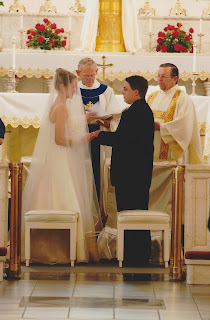I follow a handful of embryo adoption blogs and know that there are a variety of things that the donating couple could be called without incurring much debate: genetic parents, donating couple, donors... With embryo adoption, unlike the other traditional forms of adoption, the genetic parents are not the birth parents. The adoptive parents are the birth parents and that's so cut and dried that there's no grounds for debate on that terminology.
And then you get to the word "biological". Que discussion.
Option A: "Biological" can be used interchangeably with "genetic".
Example: Cora and Mac are not my biological children. They do not share my genes, my DNA.
Option B: Biological is tied in with the gestational experience and birth.
Example: Cora and Mac are my biological children; we shared the biological experience of gestation and birth. They are who they are today in part because of how my body grew them.
The distinction is not quite as clear cut as one may believe due to a concept called "epigenetics". Essentially, the woman who carries the pregnancy is more than just a vessel. In the somewhat recent history of scientific discoveries, researchers have discovered that there are connections formed between the child(ren) in utero and the mother, beyond the inherited DNA. Everything put into the pregnant woman's body influences the development of the embryos.
I know that we adopted embryos, but I've found clearer wording from egg donation sources. The following quote is still relevant because in both scenarios, material is introduced in to a woman's body that is genetically foreign.
Freedom Pharmacy has a
booklet about egg donation (p. 10):
“Perhaps the greatest myth surrounds pregnancy. Many believe the
uterus is simply an incubator. Nothing could be further from the truth. The most
important aspect of all pregnancies- including egg donation pregnancies- is that
as the fetus grows, every cell in the developing body is built out of the
pregnant mother’s body. Tissue from her uterine lining will contribute to the
formation of the placenta, which will link her and her child. The fetus will use
her body’s protein, then she will replace it. The fetus uses her sugars,
calcium, nitrates, and fluids, and she will replace them. So, if you think of
your dream child as your dream house, the genes provide merely a basic
blueprint, the biological mother takes care of all the materials and
construction, from the foundation right on up to the light fixtures. So,
although her husband’s aunt Sara or the donor’s grandfather may have genetically
programmed the shape of the new baby’s earlobe, the earlobe itself is the
pregnant woman’s “flesh and blood.” That means the earlobe, along with the baby
herself, grew from the recipient’s body. That is why she is the child’s
biological mother. That is why this child is her biological child.”
Another source elaborates further on the impact of epigenetics and well, egg donation, but, as I said earlier, it's relevant in the discussion of embryo adoption too.
"Genes must be ‘expressed’ within an individual in order to have
an effect.
"The
same gene or genes can express in a number of different
ways depending upon the
environment. A gene can remain ’silent’
or unexpressed; it can be expressed
strongly; it can be expressed weakly, and so on. There is also an entire field of
study called
imprinting
having to do with which gene you ‘activate,’ the copy you received
from your mother, or
the copy you received from your father.
"The field of
epigenetics studies these
phenomenon, and
popular
journalism is just starting to write about it. While the Human
Genome Project was
still underway, we usually heard genes referred to as ‘the Bible’ of the human
being, as a kind of absolute truth concerning
the fundamental nature of the
individual.
"That is now changing.
"In a donor egg pregnancy, the
pregnant woman’s womb is the environment.It is her genes, not the donor’s, that
determine the expression of
thedonor-egg baby’s genes.
"A donor egg
baby gets her genes from the donor; she gets the‘instructions’ on the expression
of those genes from the woman
who carries her to term.
"This means
that a donor egg baby has 3 biological parents: a father,
the egg donor, and the
woman who carries the pregnancy.
"The child who is born would have been a
physically & no
doubt
emotionally different person if carried by his genetic mother.
"In
horse breeding for example, it’s not uncommon to implant a
pony embryo into the
womb of a horse. The foals that result, are different from normal
ponies.They’re bigger. These animals’ genotype – their genes – are the same as
a pony’s, but their
phenotype – what their genes actually look like in
the living animal – is different."
I kind of have mixed feelings about all of this but am struggling to put my thoughts into words. So, for now I'll ask, what do you think?

























